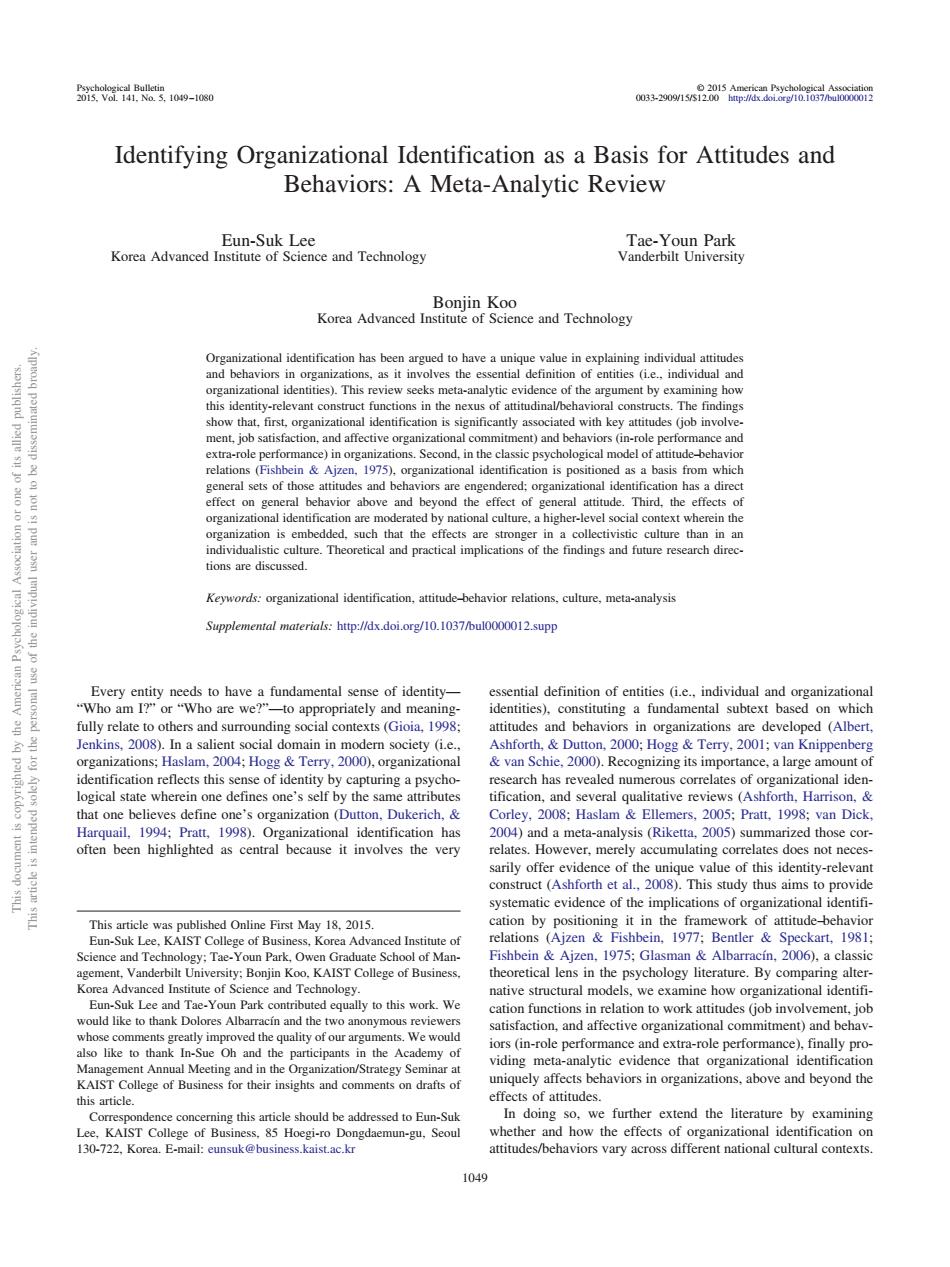正在加载图片...

0V aa.3m1ss品a5流n2i Identifying Organizational Identification as a Basis for Attitudes and Behaviors:A Meta-Analytic Review V UaPa ational identification has be ns.as it inv lves the ess ae,individhaland )and b ndividel Kyfitu-bhaviorioremet-y opa rgan zations:Haslam.2004:Hogg Terrv. 2000).organiza &van Schie.2000).Recognizing its importance.a large amount o often been highlighted as central because it involves the very relates.However,merel evidence of the implications of organizationa ntifi 108 Tae. Park.O Ajzen.1975;Glasn fn.2006).a y:B KA like to thank In-Sue Oh (in-role perf the A emy o dcxtra-olepcrfomancc inall me ors tha d th attitudes/behaviors vary across different national cultural contexts 04Identifying Organizational Identification as a Basis for Attitudes and Behaviors: A Meta-Analytic Review Eun-Suk Lee Korea Advanced Institute of Science and Technology Tae-Youn Park Vanderbilt University Bonjin Koo Korea Advanced Institute of Science and Technology Organizational identification has been argued to have a unique value in explaining individual attitudes and behaviors in organizations, as it involves the essential definition of entities (i.e., individual and organizational identities). This review seeks meta-analytic evidence of the argument by examining how this identity-relevant construct functions in the nexus of attitudinal/behavioral constructs. The findings show that, first, organizational identification is significantly associated with key attitudes (job involvement, job satisfaction, and affective organizational commitment) and behaviors (in-role performance and extra-role performance) in organizations. Second, in the classic psychological model of attitude–behavior relations (Fishbein & Ajzen, 1975), organizational identification is positioned as a basis from which general sets of those attitudes and behaviors are engendered; organizational identification has a direct effect on general behavior above and beyond the effect of general attitude. Third, the effects of organizational identification are moderated by national culture, a higher-level social context wherein the organization is embedded, such that the effects are stronger in a collectivistic culture than in an individualistic culture. Theoretical and practical implications of the findings and future research directions are discussed. Keywords: organizational identification, attitude–behavior relations, culture, meta-analysis Supplemental materials: http://dx.doi.org/10.1037/bul0000012.supp Every entity needs to have a fundamental sense of identity— “Who am I?” or “Who are we?”—to appropriately and meaningfully relate to others and surrounding social contexts (Gioia, 1998; Jenkins, 2008). In a salient social domain in modern society (i.e., organizations; Haslam, 2004; Hogg & Terry, 2000), organizational identification reflects this sense of identity by capturing a psychological state wherein one defines one’s self by the same attributes that one believes define one’s organization (Dutton, Dukerich, & Harquail, 1994; Pratt, 1998). Organizational identification has often been highlighted as central because it involves the very essential definition of entities (i.e., individual and organizational identities), constituting a fundamental subtext based on which attitudes and behaviors in organizations are developed (Albert, Ashforth, & Dutton, 2000; Hogg & Terry, 2001; van Knippenberg & van Schie, 2000). Recognizing its importance, a large amount of research has revealed numerous correlates of organizational identification, and several qualitative reviews (Ashforth, Harrison, & Corley, 2008; Haslam & Ellemers, 2005; Pratt, 1998; van Dick, 2004) and a meta-analysis (Riketta, 2005) summarized those correlates. However, merely accumulating correlates does not necessarily offer evidence of the unique value of this identity-relevant construct (Ashforth et al., 2008). This study thus aims to provide systematic evidence of the implications of organizational identification by positioning it in the framework of attitude–behavior relations (Ajzen & Fishbein, 1977; Bentler & Speckart, 1981; Fishbein & Ajzen, 1975; Glasman & Albarracín, 2006), a classic theoretical lens in the psychology literature. By comparing alternative structural models, we examine how organizational identification functions in relation to work attitudes (job involvement, job satisfaction, and affective organizational commitment) and behaviors (in-role performance and extra-role performance), finally providing meta-analytic evidence that organizational identification uniquely affects behaviors in organizations, above and beyond the effects of attitudes. In doing so, we further extend the literature by examining whether and how the effects of organizational identification on attitudes/behaviors vary across different national cultural contexts. This article was published Online First May 18, 2015. Eun-Suk Lee, KAIST College of Business, Korea Advanced Institute of Science and Technology; Tae-Youn Park, Owen Graduate School of Management, Vanderbilt University; Bonjin Koo, KAIST College of Business, Korea Advanced Institute of Science and Technology. Eun-Suk Lee and Tae-Youn Park contributed equally to this work. We would like to thank Dolores Albarracín and the two anonymous reviewers whose comments greatly improved the quality of our arguments. We would also like to thank In-Sue Oh and the participants in the Academy of Management Annual Meeting and in the Organization/Strategy Seminar at KAIST College of Business for their insights and comments on drafts of this article. Correspondence concerning this article should be addressed to Eun-Suk Lee, KAIST College of Business, 85 Hoegi-ro Dongdaemun-gu, Seoul 130-722, Korea. E-mail: eunsuk@business.kaist.ac.kr This document is copyrighted by the American Psychological Association or one of its allied publishers. This article is intended solely for the personal use of the individual user and is not to be disseminated broadly. Psychological Bulletin © 2015 American Psychological Association 2015, Vol. 141, No. 5, 1049 –1080 0033-2909/15/$12.00 http://dx.doi.org/10.1037/bul0000012 1049